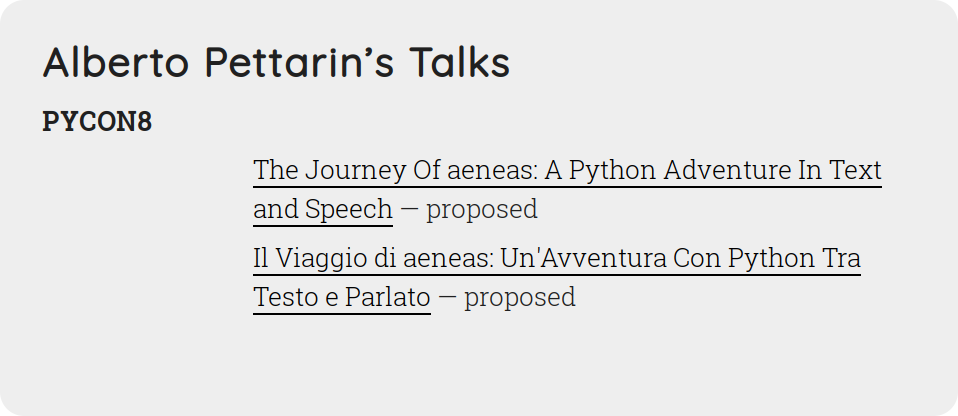My Talk Proposal Submitted To PyCon8 (PyCon Italia 2017)
RSS • Permalink • Created 24 Jan 2017 • Written by Alberto Pettarin
EDIT 2017-03-04: My talk (in Italian) was accepted, I will present it on Saturday 2017-04-08 at 15:15, see the program. If you happen to be at PyCon Otto and you are interested in aeneas, but you do not speak Italian, just come up and say hi, I will be happy to talk to you!
I submitted a talk proposal about my forced aligner aeneas to the PyData track of PyCon8, that is, PyCon Italia 2017, which will take place in Florence, Italy from 2017-04-06 through 2017-04-09.
Actually, I submitted two abstracts, one in English and one in Italian, in case someone prefers one over the other:
The talks are now subject to the community vote, which will decide what talks will be actually presented at the conference in Florence. Only the users who already registered and purchased a ticket for the conference can vote and see the submitted abstracts:
- English: The Journey Of aeneas: A Python Adventure In Text and Speech
- Italian: Il Viaggio di aeneas: Un'Avventura Con Python Tra Testo e Parlato
However, if you are curious (yes, yes, you are!), you can read the abstracts of my talk proposals below.
If you are attending PyCon8, please consider registering before 2017-01-31 to enjoy the early bird rate, and to cast your vote for each talk. Of course, if you want to hear more about aeneas in beautiful Florence, please feel free to vote for it.
(I will probably go to PyCon8 regardless of whether one of my talks will be accepted.)
The Journey Of aeneas: A Python Adventure In Text and Speech
aeneas ( https://www.readbeyond.it/aeneas/ ) is a Python library and a set of CLI tools to automagically synchronize speech and text (forced alignment), freely available on GitHub and on PyPI.
I would like to share some tips and tricks I learned while leading the development of aeneas:
- writing a bilingual code base (i.e., Python 2+3),
- speeding critical algorithms up using Python+Numpy C/C++ extensions,
- testing such a computation-intensive library,
- releasing on PyPI and creating installers for Linux/Mac/Windows,
and also touch some of its non-technical aspects:
- open sourcing a project born as a commercial product,
- dealing with the expectations of end-users,
- creating a community around the project and raising funds to sustain it.
This talk is designed to appeal to both a. developers/researchers working on computation-intensive tasks (in particular, speech technologies), and b. maintainers of Python free/open source projects. Specific knowledge of forced alignment algorithms is not required, but I suggest to have a look at the aeneas project Web page before attending.
Il Viaggio di aeneas: Un'Avventura Con Python Tra Testo e Parlato
aeneas ( https://www.readbeyond.it/aeneas/ ) è una libreria Python e un insieme di strumenti a linea di comando che sincronizza automagicamente testo e parlato (forced alignment), disponibile liberamente su GitHub e PyPI.
Vorrei condividere alcuni suggerimenti e accorgimenti pratici che ho imparato guidando lo sviluppo di aeneas:
- scrivere codice bilingue (ossia, Python 2+3),
- velocizzare gli algoritmi critici con le estensioni C/C++ di Python+Numpy,
- fare il testing di una libreria computazionalmente pesante,
- pubblicare su PyPI e creare installer per Linux/Mac/Windows,
e anche toccare alcuni suoi aspetti non tecnici:
- rendere open source un progetto nato come prodotto commerciale,
- gestire le attese degli utenti finali,
- creare una comunità attorno al progetto e raccogliere fondi per sostenerlo.
Questo intervento è strutturato per essere appetibile a. a sviluppatori e ricercatori che lavorano su problemi computazionalmente pesanti (in particolare, processamento della voce), e b. a responsabili di progetti software libero/open source in Python. La conoscenza di algoritmi di forced alignment non è richiesta, ma suggerisco di dare un'occhiata alla pagina Web del progetto aeneas prima di seguire l'intervento.
